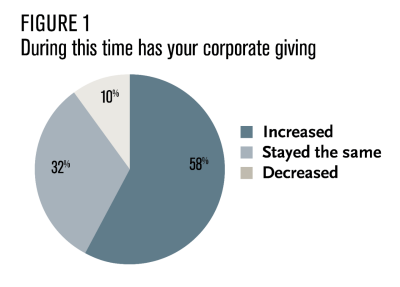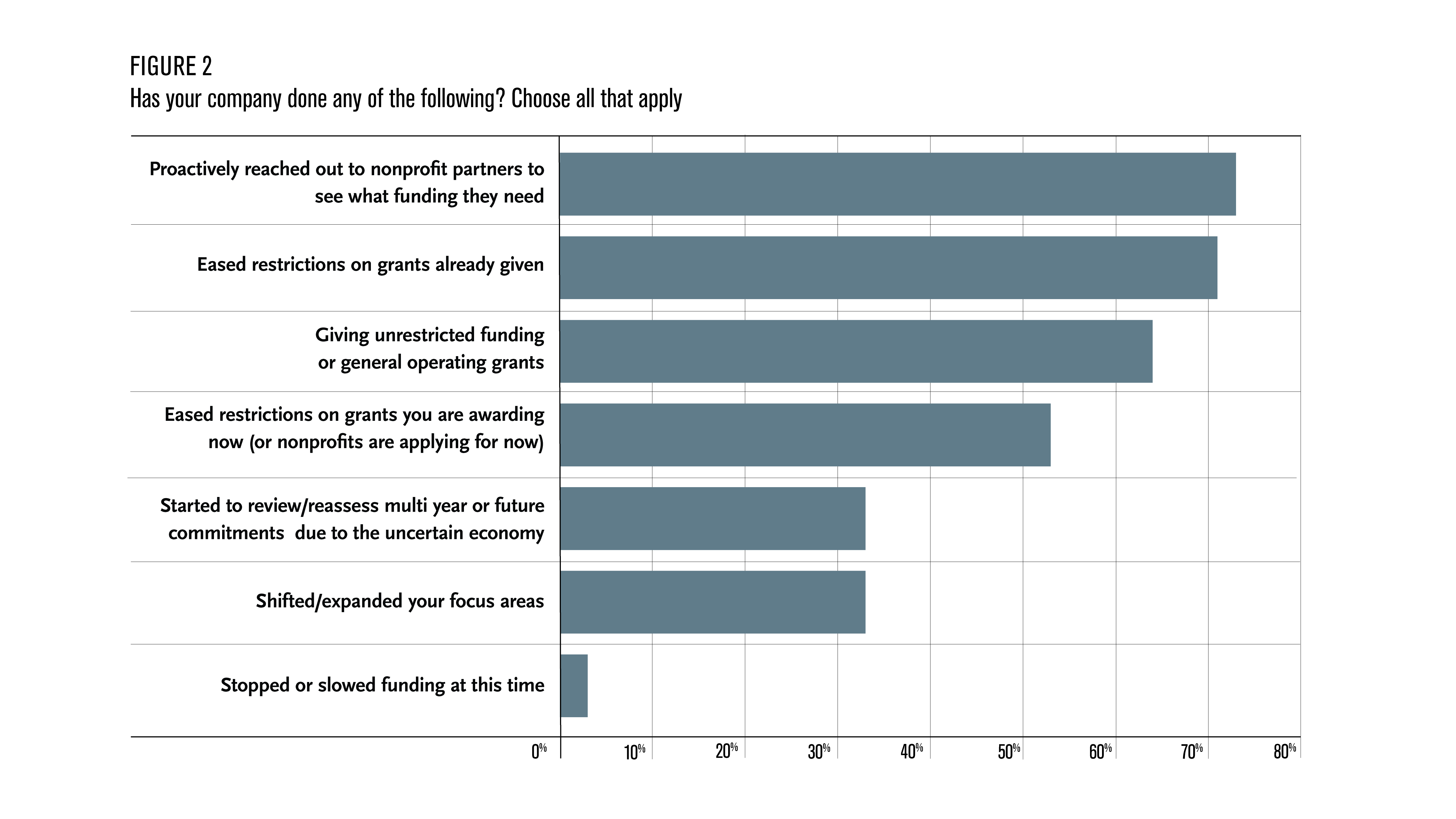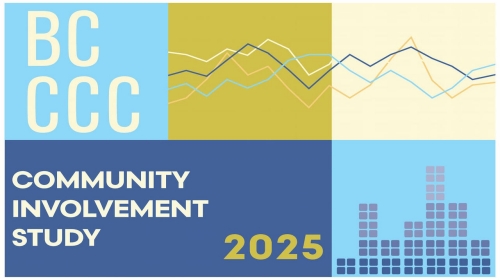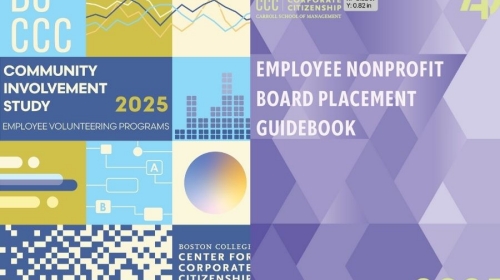WEBINAR: This webinar explores how to measure and communicate your organization's social impact with proven frameworks and strategies that matter to stakeholders.
Trust-based philanthropy: What has changed during the COVID-19 pandemic?

In response to the COVID-19 pandemic and its societal implications, companies have been donating more generously to support their employees, their customers, and society as a whole.
A recent poll of corporate citizenship professionals found that a majority have increased corporate giving during this time. (See Figure 1 at right.) While this uptick reflects normal behavior for companies in local areas affected by natural disaster, the global scope of COVID-19 has led to an exceptional amount of philanthropy in recent months. Large charitable gifts from corporations, foundations, and individuals has hit $9.7 billion worldwide to date—an amount that far exceeds records set after other disasters such as Hurricane Sandy.[1]

We have seen these numbers play out in real time this week with renewed Giving Tuesday efforts, a global day of giving usually reserved for the Tuesday following Black Friday and Cyber Monday. Last December, Giving Tuesday generated $2 billionin giving in the U.S.[2] The new event held on May 6, builds on that momentum with participation from corporate givers across sectors, including AstraZeneca, Bank of America, Citrix, Coast Capital Savings, Lam Research, MLB, PwC, and many, many more.
Aside from an increase in giving, what else has changed this year? We also polled corporate citizenship professionals to understand how they are allocating their philanthropic dollars during the pandemic, and found a mix of responses. (See Figure 2 at right.) The findings reveal smart best practices for grantmaking in this specific period, in which corporate givers are relying on established processes and creating new ones to provide relief:
Ask nonprofit partners what they need.
More than 70% of respondents reported that during this time they are proactively reaching out to nonprofit partners to see what funding they need. Especially by working with community foundations and other organizations with knowledge of local issues, firms have been able to identify unmet needs that may have been hidden otherwise, such as the crisis in food security affecting millions of children suddenly without access to school meals. As much as they can, corporate givers should keep an open line of communication with nonprofits and maintain relationships—not only to inquire about their needs for funding, but also to reassure them if or when the funding will continue.
Ease or remove grant restrictions.
A majority of respondents reported easing grant restrictions in various forms over the past few months. That includes relaxing restrictions on existing grants, current and new applications, or removing limitations altogether and allowing recipients to use grants for general operating expenses. Over the past few months, we’ve talked to corporate givers who have allowed nonprofits to keep sponsorship money for cancelled events, removed paperwork and other administrative requirements to accelerate funding, and proactively communicated to nonprofits that they are continuing multi-year grant commitments. When employees want to get involved, foundations are increasing their cap for matching gifts, quickly mobilizing employee relief funds, and plugging into companywide communications to keep their colleagues abreast of their efforts and opportunities to give.
Consider shifting your focus areas (thoughtfully).
Just slightly more than 30% of respondents reported shifting or expanding current corporate citizenship commitments, which might now include the additions of basic human needs, food security, and education. While, understandably and correctly, corporate leaders may have the automatic reaction to contribute in any way that they can, keep in mind that your corporate citizenship is at its most effective when it leverages your core capabilities as a business. Before rushing to pivot your issue areas, think about how you can realign your current focus to support different aspects of the crisis. For example, the Hilton Effect Foundation is increasing funding to long-standing partner, Clean the World, to aid in their efforts to distribute recycled soap bars to relief organizations and share information on how sanitation and hygiene can stop the virus from spreading. The Allstate Foundation, also, has renewed its commitment to existing partner, National Network to End Domestic Violence, with additional funds to support victims who are especially at risk when sheltering in place with their abusers.
Answer the tough questions.
Encouragingly, fewer than 10% of respondents reported stopping or slowing funding. However, given the economic slowdown resulting from the pandemic, it is possible that this is a real issue for you and your company. In this case, consider your options: Can you defer funding for a set period of time? Is there some other form of support you can give, such as providing employee volunteers to the organization? If you must make the difficult decision to suspend funding, try to make the most of the opportunity to stick to your corporate citizenship priorities. Is it more critical to your strategy to adhere to your main CSR issue areas, or maintain relationships with your local community? While these questions are difficult, prioritizing strategy will set you up for success once the crisis has passed.
Like most aspects of our new normal, corporate philanthropy is changing rapidly. BCCCC is here to help corporate citizenship professionals remain nimble and respond readily to the new challenges that come your way. Many of the insights from this blog post came directly from our monthly Member Meetups, which provide a safe space for CSR professionals to discuss pressing issues. For updates on opportunities such as these, visit our new Resource(ful) page. Let us know if you would like to see resources that we have not developed yet. We look forward to being able to reconnect with you in person. In the meantime… stay well!
[1] Center for Disaster Philanthropy. (2020, May 1). COVID-19 Coronavirus. https://disasterphilanthropy.org/disaster/2019-ncov-coronavirus/.
[2] GivingTuesday. (2020, March). GivingTuesday Announces Day of Global Action for Giving and Unity in Response to COVID-19. https://www.givingtuesday.org/blog/2020/03/givingtuesday-announces-day-global-action-giving-and-unity-response-covid-19.
Related Content
RESEARCH BRIEF - Researchers investigated how ESG activities help or hurt financial performance, using nine years of data from over 1,200 global companies.
RESEARCH BRIEF - Researchers analyzed 4 US energy exchange-traded funds (ETFs) over 15 years, including 2 dirty energy funds tracking fossil fuel companies and 2 clean energy funds tracking renewable energy companies.
RESEARCH BRIEF - Researchers conducted a survey, which measured perceptions of CSR and ethical leadership within the manufacturing and service industries.
WEBINAR: This webinar explores how corporate giving will be reshaped by the One Big Beautiful Bill. Hear directly from corporate citizenship leaders as they share innovative, real-world strategies that deliver impact for communities and results for business.
This study explores shifting trends in employee volunteering, corporate giving, and other means of corporate community involvement.
This guidebook offers insights on placing employees in nonprofit board service roles.
This study explores shifting trends in employee volunteering, corporate giving, and other means of corporate community involvement.








